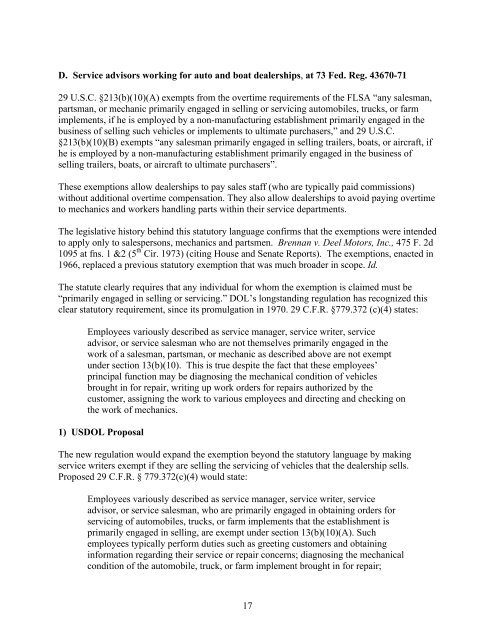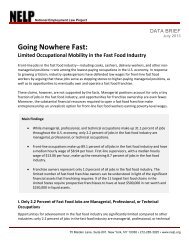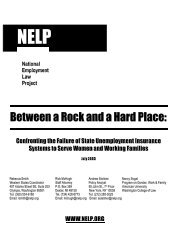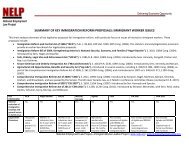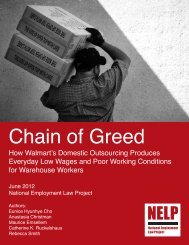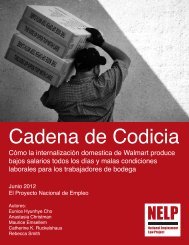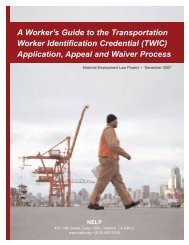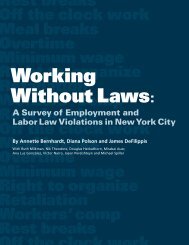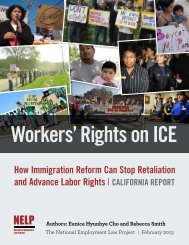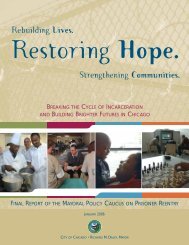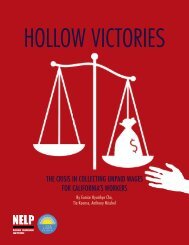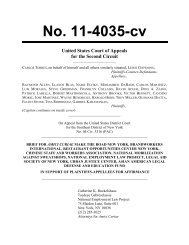National Employment Law Project
National Employment Law Project
National Employment Law Project
Create successful ePaper yourself
Turn your PDF publications into a flip-book with our unique Google optimized e-Paper software.
D. Service advisors working for auto and boat dealerships, at 73 Fed. Reg. 43670-71<br />
29 U.S.C. §213(b)(10)(A) exempts from the overtime requirements of the FLSA “any salesman,<br />
partsman, or mechanic primarily engaged in selling or servicing automobiles, trucks, or farm<br />
implements, if he is employed by a non-manufacturing establishment primarily engaged in the<br />
business of selling such vehicles or implements to ultimate purchasers,” and 29 U.S.C.<br />
§213(b)(10)(B) exempts “any salesman primarily engaged in selling trailers, boats, or aircraft, if<br />
he is employed by a non-manufacturing establishment primarily engaged in the business of<br />
selling trailers, boats, or aircraft to ultimate purchasers”.<br />
These exemptions allow dealerships to pay sales staff (who are typically paid commissions)<br />
without additional overtime compensation. They also allow dealerships to avoid paying overtime<br />
to mechanics and workers handling parts within their service departments.<br />
The legislative history behind this statutory language confirms that the exemptions were intended<br />
to apply only to salespersons, mechanics and partsmen. Brennan v. Deel Motors, Inc., 475 F. 2d<br />
1095 at fns. 1 &2 (5 th Cir. 1973) (citing House and Senate Reports). The exemptions, enacted in<br />
1966, replaced a previous statutory exemption that was much broader in scope. Id.<br />
The statute clearly requires that any individual for whom the exemption is claimed must be<br />
“primarily engaged in selling or servicing.” DOL’s longstanding regulation has recognized this<br />
clear statutory requirement, since its promulgation in 1970. 29 C.F.R. §779.372 (c)(4) states:<br />
Employees variously described as service manager, service writer, service<br />
advisor, or service salesman who are not themselves primarily engaged in the<br />
work of a salesman, partsman, or mechanic as described above are not exempt<br />
under section 13(b)(10). This is true despite the fact that these employees’<br />
principal function may be diagnosing the mechanical condition of vehicles<br />
brought in for repair, writing up work orders for repairs authorized by the<br />
customer, assigning the work to various employees and directing and checking on<br />
the work of mechanics.<br />
1) USDOL Proposal<br />
The new regulation would expand the exemption beyond the statutory language by making<br />
service writers exempt if they are selling the servicing of vehicles that the dealership sells.<br />
Proposed 29 C.F.R. § 779.372(c)(4) would state:<br />
Employees variously described as service manager, service writer, service<br />
advisor, or service salesman, who are primarily engaged in obtaining orders for<br />
servicing of automobiles, trucks, or farm implements that the establishment is<br />
primarily engaged in selling, are exempt under section 13(b)(10)(A). Such<br />
employees typically perform duties such as greeting customers and obtaining<br />
information regarding their service or repair concerns; diagnosing the mechanical<br />
condition of the automobile, truck, or farm implement brought in for repair;<br />
17


